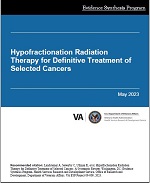
|
Recommended citation: |
Download PDF: Complete Report, Executive Summary, Report, Appendices
For breast, prostate, lung, early stage glottic, and rectal cancer, hypofractionation versus conventional radiotherapy generally did not result in differences in overall survival, disease or progression-free survival, or treatment harms. Further research is needed for cancers and radiotherapy regimens not currently evaluated, or for which there is limited evidence.
Hypofractionation therapy is delivered at similar total doses over fewer sessions and shorter time periods, compared with conventional radiotherapy. We conducted a systematic review to examine the comparative effectiveness and harms of hypofractionation versus conventional radiotherapy as definitive treatment for adults with breast, prostate, lung, rectal, head and neck, bladder, pancreas, or skin cancers.
Of 71 eligible trials, most examined breast (k=32) or prostate cancer (k=20). Fewer evaluated lung (k=8), head and neck (k=8), or rectal cancer (k=3). No eligible trials addressed bladder, pancreatic, or skin cancers.For breast cancer, moderate hypofractionation results in little to no difference in overall or disease-free survival; there were also generally no differences in treatment harms.
For prostate and rectal cancer, hypofractionation probably results in little to no difference in overall survival and may result in little to no difference in disease or progression-free survival and treatment harms.
Moderate hypofractionation for small cell lung cancer and SBRT for non-small cell lung cancer may result in little to no difference in overall and progression-free survival; evidence is very uncertain regarding treatment harms for both types of lung cancer. For early stage glottic cancer, hypofractionation may result in little to no difference in overall and disease-free survival, and most harms; evidence is mostly very uncertain for locally advanced or recurrent head and neck cancers.
For breast cancer, evidence indicated no differences in comparative effects of moderate hypofractionation across numerous patient, tumor, and adjuvant treatment characteristics; few studies addressed this for other cancers.
Hypofractionation Radiation Therapy for Definitive Treatment of Selected Cancers: A Systematic Review (Management Brief)